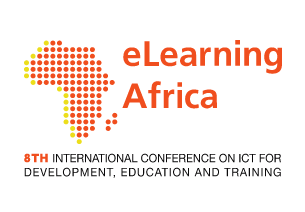eLearning Africa – 8th international conference on ICT for development, education and training

Between 29 and 31 May, “eLearning Africa”, the 8th International Conference on ICT for Development, Education and Training took place at the Safari Court Conference Center in Windhoek, Namibia. The conference is the largest conference of its kind and a key event for professionals working in eLearning and ICT supported education and training in Africa. A total of 1480 participants from 65 countries, the vast majority of them African, gathered at the event.
On May 29, a pre-conference offered several workshops and sessions. Among them, there was an introductory workshop to get to know the conference’s where’s, when’s and how’s, offering the opportunity to quick-start networking with other delegates. Another session portrayed the experiences a global IT and software provider has had in Africa. The critical comments and questions following the presentation expressed the deep desire for fundable, sustainable projects in which the African voice and spirit are clearly recognized.
At the main conference the following two days, the events focused on the nexus between pedagogy and ICT supported education as well as the integration of ICT at universities. The speakers addressed several problems and challenges connected to the use of digital technologies in the classroom. Often, there are deficiencies in the ICT infrastructure, about which teachers and teaching institutions have only limited control. Another issue was the insufficient knowledge about and experience with digital technologies not only of students but of teachers, too. An instructor needs a certain level of ICT knowledge and skills to efficiently teach students using eLearning. Too often, teachers lack experience with digital and communication technologies. Also, the lack of willingness to use eLearning techniques was discussed. Several speakers talked about how students can be motivated and encouraged to actively use the available technologies and digital ways of communication.
The speakers also pointed out benefits that come with implementing eLearning, e.g. the supporting function multimedia elements have for face-to-face lectures, the easier development and sharing of content and overall higher levels of ICT literacy.
These are only a few among other research results and practical experiences which were presented and discussed. The conference turned out to be an open forum to debate and criticize, converse and connect, offering insight into African eLearning reality.



